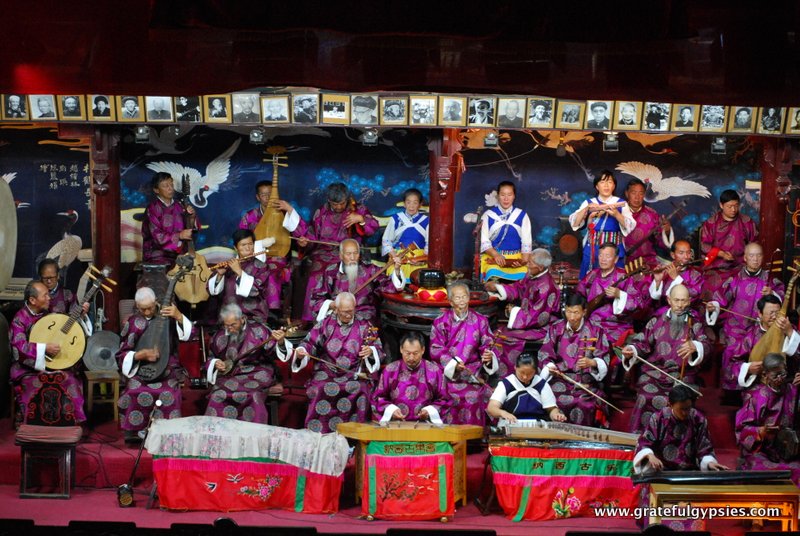Talking About Music in Chinese Posted by sasha on May 6, 2020 in Culture
Do you like listening to music? (你喜欢听音乐吗? nǐ xǐ huan tīng yīn yuè ma). I don’t know about you, but music (音乐 yīn yuè) has always been a huge part of my life. When I was younger, I played the cello (大提琴 dà tí qín) in my school’s orchestra as well as in an after-school group. When I got to high school, I switched over to the guitar (吉他 jí tā) and have been playing ever since. I also love going to concerts (音乐会 yīn yuè huì) and music festivals (音乐节 yīn yuè jié). I love talking about music in any language! In this post I’ll share some tips for talking about music in Chinese.
Music Genres in Chinese
First of all, let’s start with a basic question: What kind of music do you like? (你喜欢什么音乐? nǐ xǐ huan shén me yīn yuè).
To answer the question, just say I like (我喜欢 wǒ xǐ huan) plus the genre of music you like. To make it easier for you, I put together this chart with the Chinese vocabulary for different music genres:
bluegrass
blues
classical
country
easy-listening
electronic
folk music
heavy metal
hip hop
jazz
opera
pop
rap
R&B
reggae
rock
soul
traditional
world
兰草
蓝调
古典
乡村
轻
电子
民乐
重金属
嘻哈
爵士
歌剧
流行
说唱
节奏布鲁斯
雷鬼
摇滚
灵魂
传统
世界
lán cǎo
lán diào
gǔ diǎn
xiāng cūn
qīng
diàn zǐ
mín yuè
zhòng jīn shǔ
xī hā
jué shì
gē jù
liú xíng
shuō chàng
jié zòu bù lǔ sī
léi guǐ
yáo gǔn
líng hún
chuán tǒng
shì jiè
Note that for basically every genre, you can add the word for music to the end:
- 古典音乐 (classical music)
- 摇滚音乐 (rock music)
- 世界音乐 (world music).
This isn’t always necessary, however. The word 民乐 (folk music) already has the character for music in the name. Also, 说唱 (rap) is perfectly fine on its own, as is 歌剧 (opera).
If the conversation is clearly focused on music, you’ll be understood whether or not you add the word 音乐 onto the genre. Just don’t be surprised if Chinese people have no idea what you’re talking about if you mention something like bluegrass or world music – these genres simply aren’t very common.
Not surprisingly, pop music definitely reigns supreme in China. Rock, folk/traditional, and electronic music are all quite popular as well, and there are definitely developing electronic, heavy metal, and rap/hip-hop scenes popping up around the country.
Talking About Singers & Bands
Now that you know a lot of music genres, let’s practice talking about your favorite singers (歌手 gē shǒu) and bands (乐队 yuè duì). Here are some questions you can practice:
Who is your favorite singer? (谁是你最喜欢的歌手? shéi shì nǐ zuì xǐ huān de gē shǒu)
What’s your favorite band? (你最喜欢的乐队是什么? nǐ zuì xǐ huān de yuè duì shì shén me)
To answer either question, simply say “My favorite singer/band is…” (我最喜欢的歌手/乐队是… wǒ zuì xǐ huān de gē shǒu/yuè duì shì…) and add the name at the end.
My favorite band is Long Shen Dao (我最喜欢的乐队是龙神道 wǒ zuì xǐ huān de yuè duì shì lóng shén dào). They’re a Chinese reggae band and they’re so much fun to see live! Just check out this video I made a few years back that includes some clips of their concert in Beijing.
When talking about the singers and bands you like, you’ll want to discuss their songs (歌曲 – gē qǔ) and albums (专辑 – zhuān jí). Take my favorite Chinese band, for example. They have a song called “Fly Slowly” (他们有一首歌叫 “慢慢飞” tā men yǒu yī shǒu gē jiào “màn man fēi”). You can have a listen here:
Speaking of songs, you should definitely check out our post about the most popular Chinese songs of the decade.
Talking About Making Music
Perhaps you enjoy singing or playing an instrument (乐器 yuè qì). Both are great topics of conversation in China. After all, going to KTV is one of the most popular things to do.
Can you sing? (你会唱歌吗 nǐ huì chàng gē ma)
To answer affirmatively, simply say “(I) can” (会 huì), and to answer negatively, just add the character 不 – “(I) cannot” (不会 bú huì). Even if you can’t really sing, it’s fun to give it a try if you’re out at karaoke with friends! If you’re apprehensive, a little bai jiu (白酒 bái jiǔ) can serve as liquid confidence!
As far as talking about instruments goes, there are a few different words you use in Chinese to talk about playing them:
Can you play violin? (你会拉小提琴吗? nǐ huì lā xiǎo tí qín ma)
Can you play guitar? (你会弹吉他吗? nǐ huì dàn jí tā ma)
Can you play drums? (你会打鼓吗? nǐ huì dǎ gǔ ma)
As you can see, each of those questions uses a different verb meaning “to play.” The word 拉 is used for stringed instruments you might use a bow for or pluck, 弹 is a more general term that applies to most instruments, and 打 really means “to hit,” so is only really used for drums and other percussion.
If you’re curious to learn more about Chinese instruments, you should check out some of these past posts on them:
- Chinese Plucked Stringed Instruments
- Chinese Bowed Stringed Instruments
- Chinese Bamboo Instruments
- Chinese Bells
- Bamboo Flute
- Traditional Drumming
- Guqin (7-string plucked instrument)
- Erhu (2-string Chinese violin)
I hope you enjoyed this post on talking about music in Chinese. I’d love to hear some comments from our readers. Try to answer some of the questions from this post in Chinese! Tell us your favorite singer or band, what instruments you play, what genres you like, or whatever you feel like typing!

Build vocabulary, practice pronunciation, and more with Transparent Language Online. Available anytime, anywhere, on any device.







Leave a comment: